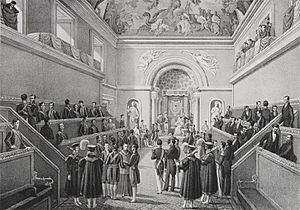House of Peers (Spain) facts for kids
The House of Peers (in Spanish, Estamento de Próceres) was an important part of the Spanish government a long time ago. It was like one of two main groups that made laws in Spain between 1834 and 1836. This group was known as the "upper house" of the Spanish parliament, called the Cortes.

Contents
What Was the House of Peers?
The House of Peers was created by a special law in 1834 called the Royal Statute of 1834. This law set up a parliament with two parts. One part was the House of Peers. The other part was the House of Representatives (called Estamento de Procuradores). Having two parts like this is known as a bicameral parliament.
Who Were the Members?
The people who were part of the House of Peers were called Grandees. In Spain, a Grandee was a very important noble, often from a powerful family. They had special privileges and a high rank in society. Being a Grandee meant you were part of the highest nobility.
Why Was It Created?
The House of Peers was created to help govern Spain during a time of change. It was part of a new system to make laws and manage the country. The members, being important nobles, were expected to bring their experience and influence to the law-making process.
What Happened to the House of Peers?
The House of Peers did not last for a very long time. It existed only for about two years, from 1834 to 1836. After 1836, the way the Spanish parliament worked changed again.
New Names for Parliament
From 1837 onwards, the two houses of the Cortes got new names. The upper house, which used to be the House of Peers, became known as the Senate. The lower house, which was the House of Representatives, became the Congress of Deputies. These new names are still used for the Spanish parliament today.
See also
 In Spanish: Estamento de Próceres para niños
In Spanish: Estamento de Próceres para niños
 | Delilah Pierce |
 | Gordon Parks |
 | Augusta Savage |
 | Charles Ethan Porter |

